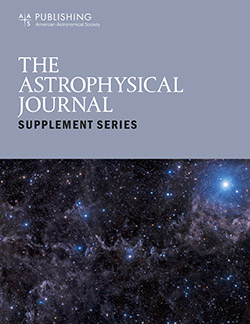A Comprehensive Analysis of Repeating Fast Radio Bursts
IF 8.5
1区 物理与天体物理
Q1 ASTRONOMY & ASTROPHYSICS
引用次数: 3
Abstract
Abstract Nearly 700 fast radio burst (FRB) sources have been detected so far, of which 29 are found to burst out repeatedly. Although a firm connection between at least some FRBs and magnetars has been established, the trigger mechanism and radiation process in these enigmatic phenomena are still highly controversial. In this study, we build a sample of 16 repeating FRBs from which at least five bursts have been detected, including the most active four repeaters of FRBs 20121102A, 20180916B, 20190520B, and 20201124A. Various key parameters of their bursts are collected from the literature, which include the arrival time, pulse width, dispersion measure (DM), Faraday rotation measure (RM), bandwidth, waiting time, peak flux, and fluence. The distribution and time evolution of these parameters are investigated. Potential correlations between various parameter pairs are also extensively explored. The behaviors of different repeaters are then compared. It is found that the DM of FRB 20121102A seems to increase continuously on a long timescale. While the DM of most repeaters varies in a narrow range of ±3 cm −3 pc, FRB 20190520B is found to have a large variation range of ±12 cm −3 pc. The RM evolves with time in a much more chaotic behavior in different repeaters. A linear correlation is found between the absolute mean RM and DM Host , which may provide a method to estimate the redshift of FRBs. Generally, the waiting time shows a similar bimodal distribution for the active repeating sources. The implications of these features to the underlying physics are discussed.重复快速射电暴的综合分析
迄今为止,已经探测到近700个快速射电暴(FRB)源,其中29个被发现是重复爆发的。尽管至少有一些快速射电暴与磁星之间已经建立了牢固的联系,但这些神秘现象的触发机制和辐射过程仍然存在很大争议。在这项研究中,我们构建了一个由16个重复快速射电暴组成的样本,其中至少有5个射电暴被探测到,包括最活跃的四个重复射电暴20121102A、20180916B、20190520B和20201124A。从文献中收集了其爆发的各种关键参数,包括到达时间、脉冲宽度、色散量(DM)、法拉第旋转量(RM)、带宽、等待时间、峰值通量和通量。研究了这些参数的分布和时间演化规律。还广泛探讨了各种参数对之间的潜在相关性。然后比较了不同中继器的性能。结果表明,FRB 20121102A的DM在长时间尺度上呈连续增加的趋势。大多数中继器的DM变化范围很窄,为±3cm−3pc,而FRB 20190520B的DM变化范围很大,为±12cm−3pc。在不同的中继器中,RM以更加混乱的行为随时间演进。发现RM的绝对平均值与DM主机之间存在线性相关,这可能为快速射电暴的红移估计提供了一种方法。一般情况下,活动重复源的等待时间呈现类似的双峰分布。讨论了这些特征对底层物理的影响。
本文章由计算机程序翻译,如有差异,请以英文原文为准。
求助全文
约1分钟内获得全文
求助全文
来源期刊

Astrophysical Journal Supplement Series
地学天文-天文与天体物理
CiteScore
14.50
自引率
5.70%
发文量
264
审稿时长
2 months
期刊介绍:
The Astrophysical Journal Supplement (ApJS) serves as an open-access journal that publishes significant articles featuring extensive data or calculations in the field of astrophysics. It also facilitates Special Issues, presenting thematically related papers simultaneously in a single volume.
 求助内容:
求助内容: 应助结果提醒方式:
应助结果提醒方式:


